 |  |
By Tom Gatch
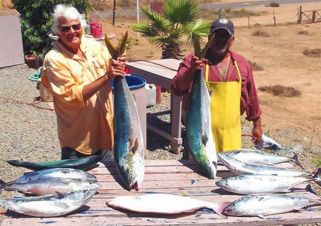
When scientists predicted that El Niño conditions would prevail along the Eastern Pacific coast this summer, they weren’t kidding. As it turns out, surface water temperatures have been running a good 6 to 7 degrees above normal as southerly hurricanes continue to push warm, tropical water up the Baja California coast and on into U.S. territory. For those fishing from pangas between La Salina and San Quintín, it has meant having periodic access to a few offshore species, such as yellowfin tuna and dorado, which are usually beyond their range.
In Punta Banda, Vonny’s Fleet Sportfishing reports an occasional showing of football sized yellowfin, but indicated that their clients have also been hooking up regularly with quality grade yellowtail and large bonito, along with some chunky calico bass and a few nice halibut. Capt. Louie Prieto, of Its4Reels Sportfishing in Ensenada says that the offshore bite continues to be on fire, with a few big tuna over 90 pounds being brought over the rail by his customers.
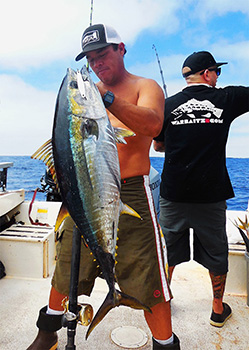
To the south, K & M Sportfishing operating out of Bahía San Quintín has been having fantastic success offshore as well. Yellowfin tuna have been their primary blue water target, but bluefin tuna and dorado have been showing up in the catch as well. Closer to shore, the yellowtail bite is good, as has been the fishing for big white sea bass just off of Socorro Beach a couple miles down. As always, there are also plenty of rockfish and lingcod available for those who like dropping to the bottom to catch ‘taco material’.
Isla Cedros, just off Baja’s Pacific coast, is always a great place to fish during summer; but this year the action has been particularly impressive, reports Cedros Outdoor Adventures, who operate a fishing resort on the island. In addition to the trophy size calico bass that the nearby kelp beds have become famous for and the wide open fishing for big yellowtail, the unseasonably warm water recently has sparked a bite on quality grade white sea bass, which have become a favorite species among visiting anglers because of their gourmet quality at the dinner table. Back on the mainland, areas between Bahía Asunción and Bahía Magdalena are still cleaning up after being brushed by hurricane Marie back in August and later smacked by hurricane Odile in late September. This disruptive duo of cyclones not only inflicted substantial property damage, but also churned up the inshore bottom so much that literally thousands of Pismo clams were wrenched up from their sandy homes and smashed onto the beach killing most of them. It may take years for the local population of these highly prized bivalve mollusks to fully recover from the thrashing.
Down in the Los Cabos region, JC Sportfishing Charters says that the billfish action was good after Hurricane Marie passed, and had opened back up with a great striped marlin bite as well as a few blues being hooked before the devastation inflicted by hurricane Odile. As fishing rebounds, live bait and trolled lures have been the ticket, which have even produced a few fish over 300 pounds. Just around the corner in San Jose Del Cabo, Erik Bricston at Gordo Banks Pangas says they are now back on track and offers, “Ocean water temperatures are now averaging in the upper 80’s throughout the region. Water clarity varied, southern breezes will push in off colored currents, though for the most part blue water has been found within a few miles of shore, which is normal for the summer season.
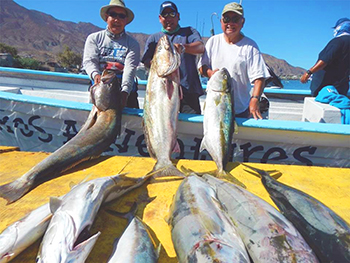
The bait situation has consisted of limited amounts of sardinas; these schooling baitfish are just moving back in to the Puerto Los Cabos Marina jetty area, small juvenile sized, but have been the ticket to getting into the local yellowfin. The bite for the larger grade of yellowfin tuna continues far to the north, near Los Frailes, not within range of a normal charter from San Jose del Cabo, actually closer for the East Cape fleets, though a handful of charters from the San Jose are making the long trek.
Dorado schools were scattered, mostly small sized fish, lots of females, good practice to always release these juvenile dorado to give them a chance to mature, reportedly these popular gamefish are one of the more rapidly growing fish, gaining five pounds per month. Bottom action remains slow, with a few dogtooth snapper and deep water grouper being found off the rock piles. The best chance at hooking into these fish while using yo-yo style jigs has been very early in the morning, right after the sun comes up.”
Just up the Cortez coast near Los Barriles, John Ireland at Ranch Leonero says that they were relatively well treated by Odile, with only a single window broken at Ireland’s home. He indicated, “Sailfish are the most plentiful at the moment. Best area proved to be 5- to 10-miles off Cabo Pulmo. Most success was on lures with trolled ballyhoo a close second. Some blues were also taken on jigs. The stripers have gone quiet which is usual this time of year.
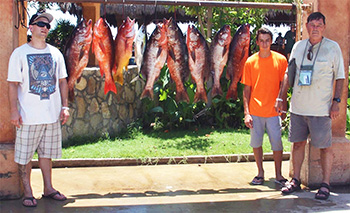
The tuna bite down south, just past Los Frailes, continues to produce fish. They are biting exclusively on sardinas. Dead or alive the sardinas are what they want. These are good fish, 25- to 45-pounds. Anglers can expect 4 to 8 fish per day. Kind of slow, but patience does pay off. There are schools of porpoise holding fish outside, but they have proved to be picky biters. The dorado are spread all over; boats are finding schools all over the East Cape and are picking out the bigger fish and releasing the small ones. Some better quality dorado are being taken amongst the tuna.
Ireland concluded his report by adding, “A few more roosters are showing up along the beach near the hotel, and some really big fish up to 60-pounders have been nailed near the new marina entrance. Some huge pargo in the 40-pound range were taken in front of actor Scott Glenn’s house, between the Ranch and La Ribera. Big pargo are lurking in the tree stumps and reefs. It’s tough to get them out, but fun trying. Dropping down a big live bait is working is best. Then it's just a tug-o- war!”
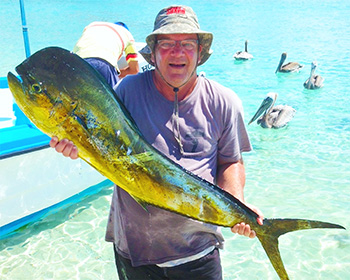
Despite brushes with inclement weather, the popular dorado is still being caught off La Paz. Further north, in the city of La Paz, Jonathan Roldan at Tailhunter International reports that although Hurricane Marie created a few problems as far as fishing consistency is concerned, things seem to be getting back to normal. “Because of the threat of thundershowers, we still haven’t been doing do much fishing around Las Arenas. It has just been easier to keep fishing out of La Paz, where our anglers had a better shot at good weather and more chances to get into fish, even if the weather late in the day soured. However, when we did fish, the fishing was fine. We got into some fat tuna! Yes...there were some big boy tuna that showed up. Several guys hooked into yellowfin tuna estimated at over 100 pounds, but all the fish broke off without ever seeing the fish. The area was around the south point of Cerralvo Island. As for other species, the fun-sized 10 to15 pound dorado have been pretty easy to catch as well as big bonito. But the nice surprise has been our large number of hookups on sailfish and striped marlin. Although, most of these fish either got loose or were broken off. We have also been getting some nice rooster fish along the beach in the 20 to 40 pound class.”
Up near the northern end of the Sea of Cortez, boats returning from multi-day mothership panga fishing adventures with Tony Reyes Sportfishing continue to return to port with limit catches of yellowtail along with a bevy of other species including dorado, grouper, snapper and cabrilla. The message is clear: fishing around the Baja California peninsula this fall should be rewarding and productive just about anywhere you plan to go!

Wonderful customer service, they made it easy to get my motorcycle insured for a last minute trip...

I've had Baja Bound insurance for more that ten years now with thousands of miles logged in Baja....

The level of service I have received from Baja Bound (Yara) has been nothing less than exceptional....